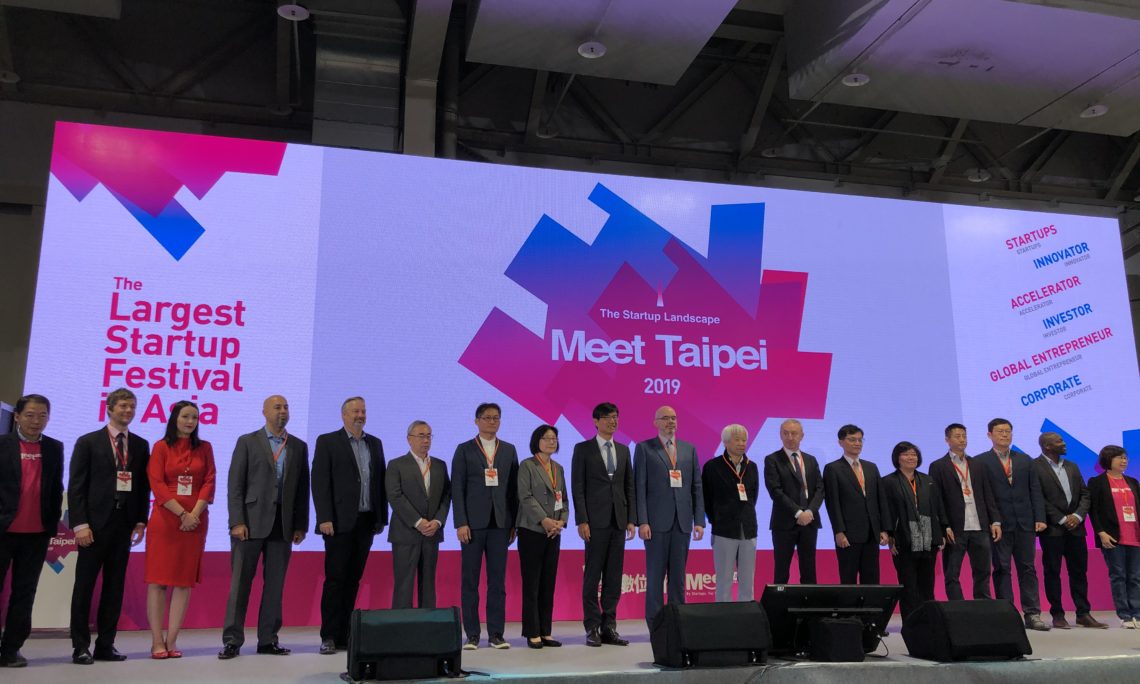OT-1987
November 14, 2019
Remarks by AIT Acting Director Raymond Greene at Opening Ceremony of Meet Taipei 2019
November 14, 2019
(As Prepared for Delivery)
Small and Medium Enterprise Administration Director General Ho, Ministry of Economic Affairs Director General Lee, Ministry of Science and Technology Director General Chyou, distinguished guests, ladies and gentlemen, zao an!
I’m pleased to be here today to help open Meet Taipei 2019. Walking around the Expo, one cannot help but feel they are seeing the future.
As many of you know, this year AIT is celebrating its 40th birthday and the 40th anniversary of the Taiwan Relations Act through our AIT@40 campaign. Each month, we highlight a different aspect of the U.S.-Taiwan relationship. November is Innovation and Entrepreneurship Month. Last week, we kicked off the month with two major events. More than 1,000 people gathered for the 1st Annual Talent Circulation Summit, which we organized in cooperation with the Ministry of Economic Affairs. At the Summit, participants learned of all the latest opportunities for talent exchange, talent cultivation, and talent connection in the digital space. We also, for the first time ever, co-hosted with Taiwan international cyber offensive and defensive exercises. Just as a physical economy needs physical security, the emerging digital economy depends upon adequate cybersecurity to protect hard won intellectual property, trade secrets, and data.
U.S.-Taiwan Startup cooperation is robust. For the last three years, we have been working together under the auspices of the U.S.-Taiwan SME Work Plan. In cooperation with the Small and Medium Enterprise Administration, we have organized a large-scale Global Entrepreneurship Congress on using A.I. and IoT for social good, and the first ever Women’s Economic Empowerment Summit, which was attended by more than 600 people from 20 countries throughout the region. Next year, we look forward to working with them to expand opportunities for social entrepreneurs, women entrepreneurs, and to continue to integrate the startup ecosystems of the United States, Taiwan, and Southeast Asia.
This week, the Port of San Diego Legislative Policy Administrator David Yow is in Taiwan to explore with his counterparts how to transform ports into hubs of the blue and circular economies. He will speaking with all of you at two this afternoon on this very stage. As many of you know, next week is Global Entrepreneurship Week where around the world we celebrate entrepreneurs and the contributions they make. To mark Global Entrepreneurship Week, as part of our StartOpps initiative, more than 20 women entrepreneurs and mentors from Southeast Asia and other parts of the world will be coming to Taiwan to connect with their counterparts and learn from Taiwan’s example on promoting women’s entrepreneurship. Their visit will conclude with the 1st Annual Talent Circulation Alliance Women’s Empowerment Expo on November 21st at Huashan Creative Park. Everyone is invited to attend and hear from some of the most inspiring women leaders from the United States, Taiwan, and Southeast Asia as well as find out about opportunities to join some of Taiwan’s leading women’s empowerment associations.
In this light, I would like to offer two suggestions based on the U.S. experience for helping kick Taiwan’s innovation culture into an even higher gear.
First, everyone gathered here today should make an active effort to forge closer ties between the startup community, academia, and research institutions. The secret sauce of U.S. innovation is close collaboration between academia, industry, and research institutions. Virtually all innovation clusters in the United States emerged out of anchor universities. Silicon Valley came out of Stanford. The Research Triangle in North Carolina grew out of Duke, and Austin’s technological renaissance arose from the University of Texas. The list goes on. Thanks to the leadership of the Ministry of Science and Technology and others, we are beginning to see similar developments here in Taiwan. I encourage more of this to take place.
Second, everyone should actively pursue any and all international exchange opportunities they become aware of. Much of Taiwan’s technology industry was established by people who studied in the United States and came back to found what are now some of Taiwan’s most successful companies. This is especially true in the semiconductor industry, with such giants as TSMC’s Morris Chang and Etron’s Nicky Lu. When Taiwan’s talent studies or works in the United States, they return equipped not only with the skills and vision to succeed in Taiwan, but also the personal connections that form the glue of U.S.-Taiwan technology cooperation.
As we move forward together to build the digital age, we look forward to continuing to work closely with all of you here today and the organizers of Meet Taipei. Taiwan’s future depends upon moving up the value-chain to become a full-fledged innovation-based economy. This depends almost entirely upon cultivating a vibrant startup ecosystem, and Meet Taipei has been leading the way. Their example of combining the latest news within the startup world with monthly and annual events aimed at ecosystem building is an international model for other countries to emulate. Through our StartOpps initiative, we are working with Meet Taipei to help spread their model throughout the region. Further, we are looking forward to working closely with them as our leading partner under the Talent Circulation Alliance to help expand the free flow of startup talent throughout the Indo-Pacific and to cultivate startup talent through outreach and training programs.
We look forward to working with all of you on the amazing journey to come.
Thank you.
















![Video Thumbnail [Recovered]-01](../wp-content/uploads/sites/269/Video-Thumbnail-Recovered-01-1-750x450.jpg)






